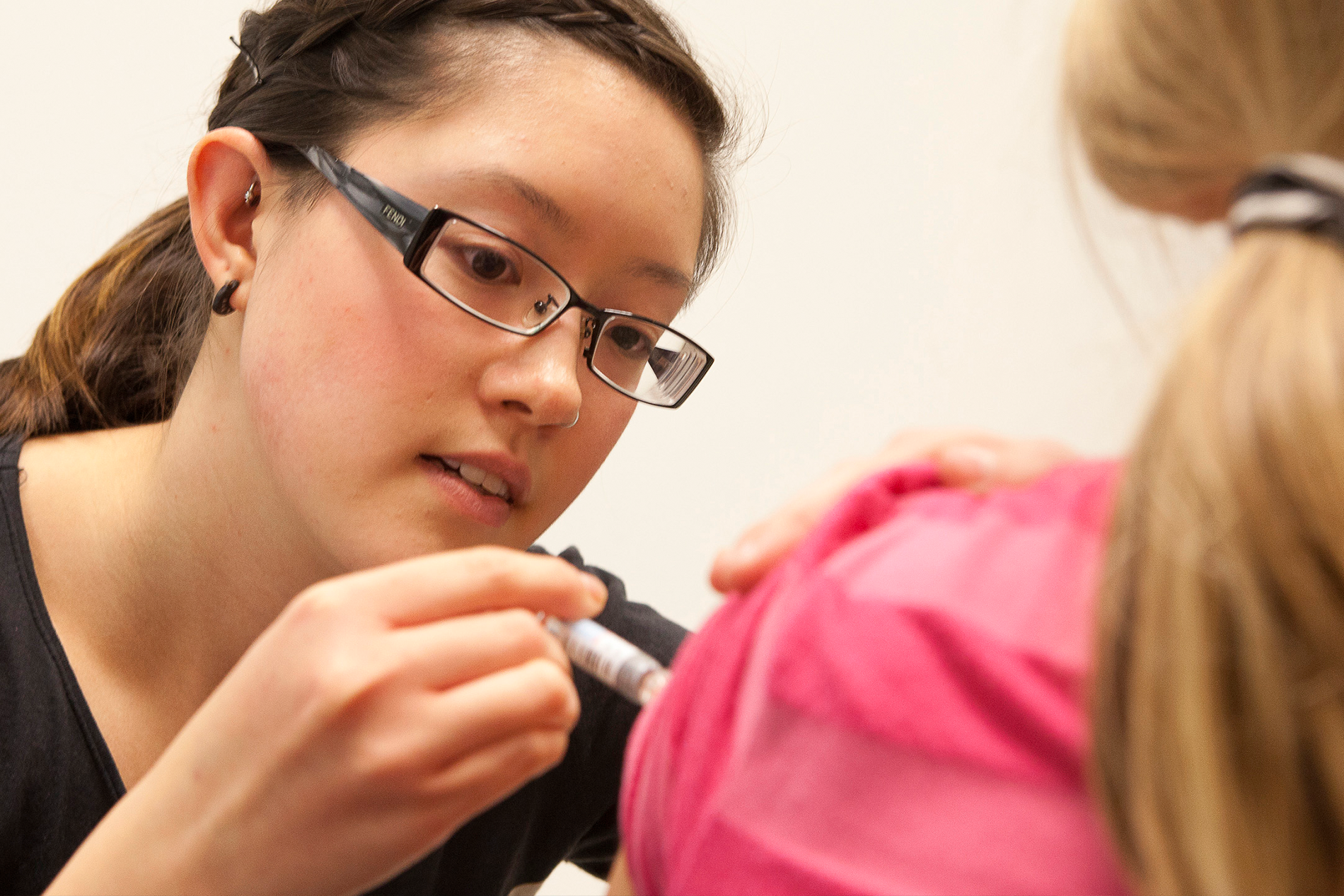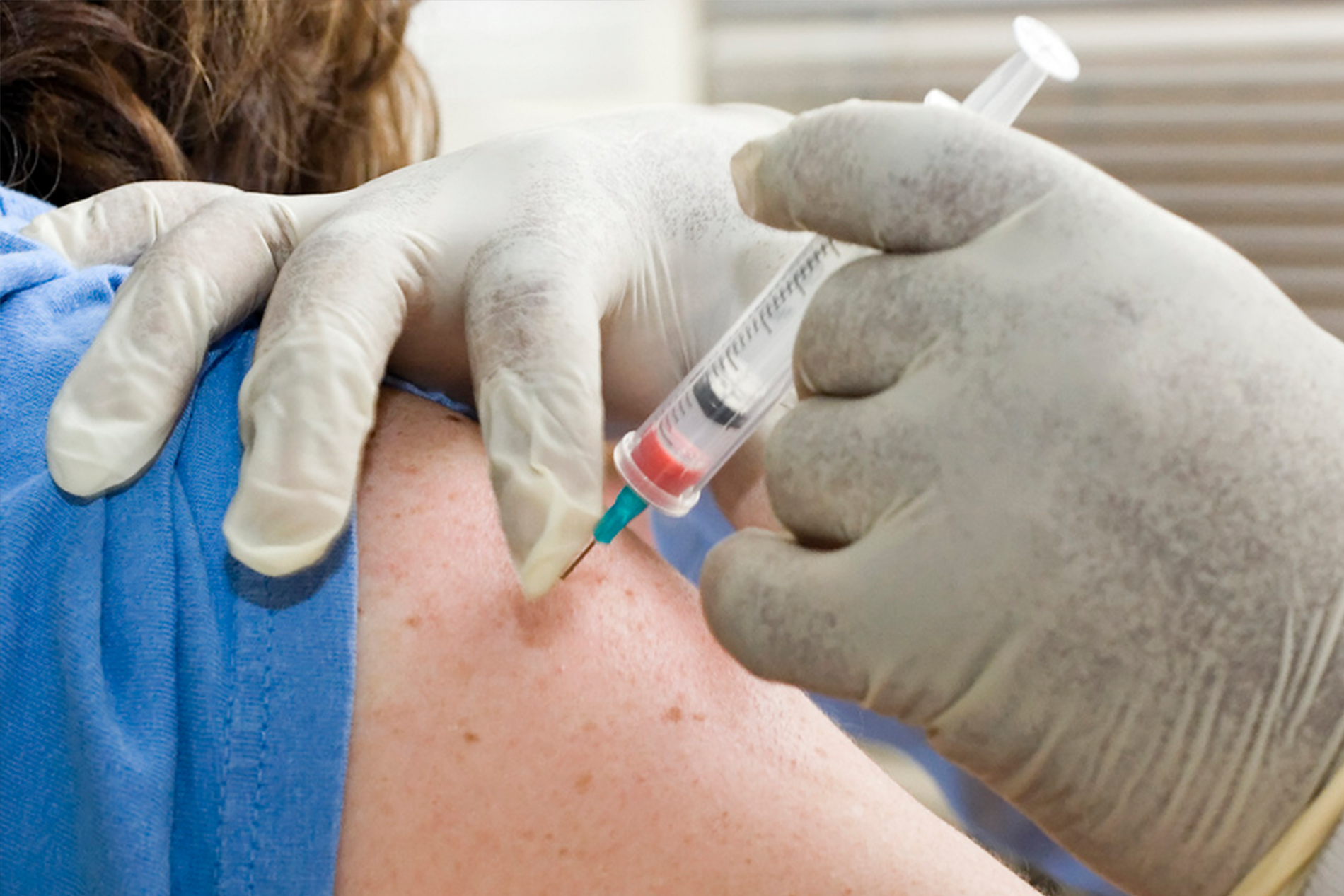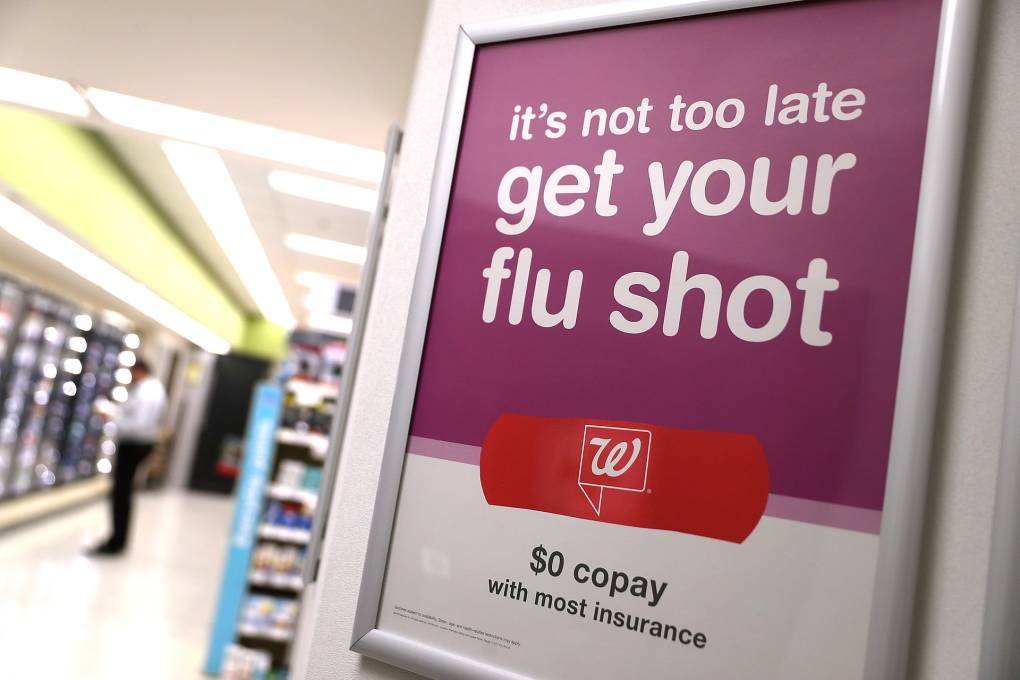We’re over three years into the COVID pandemic. And as we’ve seen this summer, with the new Eris variant, COVID continues to infect folks of all ages and still results in severe disease and hospitalization for some.
But please don’t forget: The flu remains a potentially serious threat to your health too.
Jump straight to:
- When should I get my flu shot?
- Can I get my new COVID vaccine and my flu shot at the same time? What about the RSV vaccine?
- Where can I get a flu shot, with or without insurance?
Why is the flu so serious?
Back in 2020, the U.S. saw a record-low number of flu cases — most likely due to widespread mask-wearing, increased hygiene, social distancing and remote work and school. And the Centers for Disease Control and Prevention says that flu activity has overall “been lower than observed before the pandemic.”
Nonetheless, the CDC estimates that last year’s flu season resulted in 19,000–58,000 deaths from flu and 300,000–650,000 flu hospitalizations. The agency says that the 2022–2023 flu season caused up to 54 million illnesses.
But the organization says that in the 2021–2022 flu season, just under half of adults got a flu shot — a slight decrease from the previous season.
Why should I get a flu shot?
Getting a flu vaccine can prevent you from getting sick with the flu, which is a draining, unpleasant experience even if your symptoms are not severe. And if you do get the flu, having a flu shot can also stop you from getting sick enough to have to visit the hospital (and be exposed to all the COVID risks hospital settings can still bring).
The CDC says the flu vaccine also offers other potential health impacts, such as being associated with lower rates of certain cardiac events for people who have heart disease. It’s also the best, safest way not only to protect yourself against the influenza virus, but also to minimize the chance you will spread it to others — folks who could be at far higher risk for serious complications or even death if they were to become infected. Read more from the CDC about what the flu shot can do for you.
Keep reading to find out whether you should be getting your flu shot right now, and where to find free or low-cost flu shot options near you.
Should I get a flu shot now, or wait?
The recommendations medical professionals make about when to get a flu shot are based on the fact that it takes about two weeks after you get vaccinated for antibodies to develop and provide protection against the flu.
This 2023–2024 season, as with previous seasons, the CDC says that September and October are “the best times for most people to get vaccinated.” These recommendations are based on traditional predictions of flu season starting in November and peaking around January or February.

Dr. Peter Chin-Hong, an infectious disease expert at UCSF says that yes, there’s evidence that your risk of getting the flu increases every month after your flu shot, due to the antibodies waning over time.
But when medical professionals talk about strategically “waiting” to get a flu shot, they’re aiming that advice at those who are at particularly high risk for more serious complications related to the flu. That includes:
- People over 65.
- Folks with chronic medical conditions.
- Pregnant people (or those who are planning to become pregnant).
- Kids under 5.
Delaying inoculations for these populations is based on the idea of getting the shot at a time Chin-Hong calls “the sweet spot,” around mid-to-late October. Two weeks later, right around early November, the antibodies should have developed, just as flu season is (usually) getting serious. Think of it as getting the “biggest bang for your buck,” he said.
So, if you’re in one of those vulnerable categories, yes, you can think about waiting, says Chin-Hong. People over 65 might also consider requesting special flu vaccines for this age group — read more about this below. As with all health matters, if you’re looking for advice, it’s best to consult your health care provider or someone you see regularly for your medical needs.
And what if you’re under 65, not pregnant and don’t have other risk factors for severe flu? If you can truly trust yourself to plan ahead and not forget to make the appointment, getting it by Halloween (i.e., before October is up) is best, Chin-Hong said. But remember: Not only are you human, and it might slip your mind, but predictions about how the flu season might behave are just that — predictions.
Flu cases might start to rise earlier than anticipated, throwing previous notions of a “best time” to get the vaccine into disarray. So, take that “October rule” with “a grain of salt,” Chin-Hong advised, and “get [your flu shot] when you get it.”
What if you plan to get your flu shot in October with the best of intentions, but you still forget? If Nov. 1 comes and goes, and you realize you haven’t been vaccinated, all is not lost — since the CDC says that “vaccination after October can still provide protection during the peak of flu season,” which is usually February.
In other words, just go get the shot already — whenever that may be.

Can I get my new COVID vaccine and my flu shot at the same time?
It’s totally fine, and safe, to get your flu shot at the same time as your new COVID vaccine, and you’ll find that COVID vaccine appointments will often prompt you to “add on” a flu shot at the same session — especially at pharmacies. Although, if you’re trying to schedule your kid’s vaccinations, the CDC advises that you first talk to your pediatrician about the best schedule for the COVID and flu vaccines (and now the RSV — respiratory syncytial virus — preventive treatment too).
But if that optimal time to get your flu shot is “sometime before Halloween” according to Chin-Hong — as long as flu season behaves as expected and doesn’t start in earnest before November — should you get your new COVID shot first, and follow up with a flu shot later?
If you can trust yourself to remember to seek out your flu shot by the end of October (or schedule an appointment for October in advance), yes: You might consider getting your new COVID vaccine earlier, separately from your flu shot. And if not — or if life is getting hectic, and a two-for-one vaccination appointment ensures that you actually will get your shots rather than forgetting — just go ahead and get your COVID and flu shots at the same time, when you can.
There’s also the fact that you might have to wait a little longer for your COVID shot anyway. Public health officials are urging people to first seek out the new vaccine via their health care provider, but supplies haven’t yet reached many providers. Kaiser Permanente, for example, is telling patients that shots of the new COVID vaccine won’t become available through Kaiser until early October. All this to say: You might not have a choice about waiting to get your new COVID shot — by which time, you might be approaching that optimal October flu shot time anyway, and can choose a double vaccination appointment at that time.
Chin-Hong reiterated that “if you really wanted to optimize” the timing of your flu shot, yes, “sometime in October is probably the best.” But ultimately, he says that just getting the shots is better than not getting them at all.
Read more about where to find the new COVID vaccine near you.
What about the RSV vaccine?
The CDC says that the respiratory syncytial virus — RSV — is “a common cause of respiratory illness in infants and young children, as well as older adults.” The disease results in up to 160,000 hospitalizations and up to 10,000 deaths annually among adults ages 65 years and older, says the agency.
The vaccine against the respiratory syncytial virus — RSV — is accordingly recommended by the CDC for infants, young children and adults ages 60 and older.
Most experts NPR talked to for their fall booster guide recommended getting the RSV vaccine separately from the COVID and flu vaccines.
“I think the recommendation would be if you’re going in, get your flu and COVID shot. If you’re eligible for RSV, maybe space that out by a week or two,” Dr. Peter Hotez, who leads the National School of Tropical Medicine at Baylor College of Medicine, told NPR.
Again, if you’re trying to schedule your kid’s vaccinations, the CDC advises that you first talk to your pediatrician about the best schedule for the COVID, flu and RSV vaccines.
If I have risk factors for severe flu, what kind of flu shot should I get?
If you’re age 65 or older, there are now three types of flu vaccines it’s recommended you get — because they’ll be even more effective for you than a regular flu shot.
Chin-Hong said folks in this age group should seek out these three types of vaccines because you’ll be getting “essentially a high-dose shot” or a vaccine that contains an “adjuvant” — which, in simple terms, “makes the flu shot more powerful in terms of waking up the immune system,” he said. Read more about the three kinds of flu shots available to people ages 65 and older.
Pregnant people can get a regular flu shot, although some types of flu vaccines are off-limits to pregnant people. The CDC says that getting vaccinated when you’re pregnant will not only help protect you from the flu, but also — if your baby is born during the immunity period — protect your infant in the first few months of their life when they’re too young to get vaccinated themselves.
This benefit to the baby is also the reason that pregnant people are one of the few groups who might want to consider getting a flu shot early, instead of waiting — to ensure their baby isn’t left completely unprotected for those first six months after birth when they can’t get a vaccine. Read more about the benefits of getting a flu shot if you’re pregnant.
Children ages 6 months and older can get a regular dose of the flu shot. Flu can be particularly dangerous for kids, and the CDC says that a 2022 study showed that flu vaccination reduced children’s risk of severe, life-threatening influenza by 75%.
Where can I get a flu shot if I have insurance?
If you have health insurance, a flu shot is available without extra cost as a preventive service from your usual health care provider, or at most pharmacies (see below).
It’s a good idea to wear a mask, maintain social distancing wherever possible while waiting for your shot, and dress in a top with sleeves you can easily pull up to your shoulder, to make receiving the injection even easier (and quicker).
Common places to find a flu shot appointment, walk-in site or drive-thru flu shot:
- CDC’s Find Flu Vaccines tool.
- Kaiser Permanente flu shots (Northern California).
- CVS flu shots.
- Walgreens flu shots.
- Rite Aid flu shots.
- Costco Pharmacy flu shots.
- Albertsons (Safeway) flu shots.
Where can I get a flu shot if I don’t have health insurance?
If you want a flu shot but don’t have health insurance, you can get the vaccine free of charge from several providers and community clinics around the Bay Area. (You can also technically use these free services even if you do have insurance, but you may consider choosing to free up these particular resources for those who are not covered.)
Your county’s public health department may also be offering flu shots.
Places to get a free or low-cost flu shot in the Bay Area include:
- San Francisco Department of Public Health’s AITC clinic (offers a pay-what-you-can option).
- Contra Costa Public Health Immunization Clinic (flu shots are $15 for adults over 19, but fees may be waived if you’re unable to pay).
- Alameda County Immunization Clinics.
